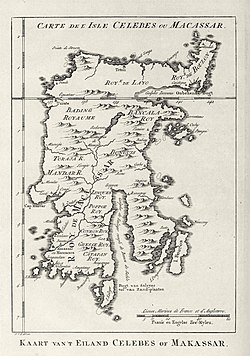Gowa Sultanate
| Sultanate of Gowa Baté Salapang ᨅᨈᨙᨔᨒᨄ |
||||||||||||
| Part of Indonesia | ||||||||||||
|
||||||||||||
|
Flag
|
||||||||||||
| Capital | Sungguminasa | |||||||||||
| Languages | Makassarese | |||||||||||
| Religion | Sunni Islam | |||||||||||
| Government | Monarchy | |||||||||||
| Sultan | ||||||||||||
| • | 1300 | Tumanurung | ||||||||||
| • | 1653-1669 | Sultan Hasanuddin Tuminanga ri Balla'pangkana | ||||||||||
| • | 1946-1978 | Sultan Muhammad Abdul Kadir Aiduddin | ||||||||||
| • | 2014-Present | Sultan Kumala Idjo Batara Gowa | ||||||||||
| History | ||||||||||||
| • | Established | 14th century | ||||||||||
| • | Dissolution of Sultanate | 1945 | ||||||||||
| Currency | No official currency, the Barter system was used | |||||||||||
|
||||||||||||
| Today part of |
|
|||||||||||
Sultanate of Gowa (sometimes written as Goa; not to be mistaken with Goa in India), was one of the great kingdoms and the most successful kingdom in the South Sulawesi region. People of this kingdom come from the Makassar tribe who lived in the south end and the west coast of southern Sulawesi.
Before the establishment of the kingdom, the region had been known as Makassar and its people as Suku Makassar (tribe of Makassar). The history of the kingdom can be divided into two eras: pre-Islamic kingdom and post-Islamic sultanate.
According to the epic poem The Nagarakretagama, in praise of King Rajasanagara of Majapahit, it lists Makassar as one of the kingdom's tributaries in 1365.
The first queen of Gowa was Tomanurung Baine. There is not much known about the exact time when the kingdom was established nor about the first queen, and only during the ruling of the 6th king, Tonatangka Kopi, local sources have noted about the division of the kingdom into two new kingdoms led by two Kopi's sons: Kingdom of Gowa led by Batara Gowa as its 7th king covering areas of Paccelekang, Pattalasang, Bontomanai Ilau, Bontomanai 'Iraya, Tombolo and Mangasa while the other son, Karaeng Loe ri Sero, led a new kingdom called Tallo which includes areas of Saumata, Pannampu, Moncong Loe, and Parang Loe.
For years both kingdoms were involved in wars until the kingdom of Tallo was defeated. During the reign of King of Gowa X, I Manriwagau Daeng Bonto Karaeng Lakiung Tunipalangga Ulaweng (1512-1546), the two kingdoms were reunified to become twin kingdoms under a deal called Rua Kareng se're ata (dual kings, single people in Makassarese) and enforced with a binding treaty. Since then, when someone becomes a king of Tallo, he also becomes the king of Gowa. Many historians then simply call these Gowa-Tallo twin kingdoms as Makassar or just Gowa.
The traces of Islam in South Sulawesi existed since the 1320s with the arrival of the first Sayyid in South Sulawesi, namely Sayyid Jamaluddin al-Akbar Al-Husaini, who is the grandfather of Wali Songo.
...
Wikipedia


